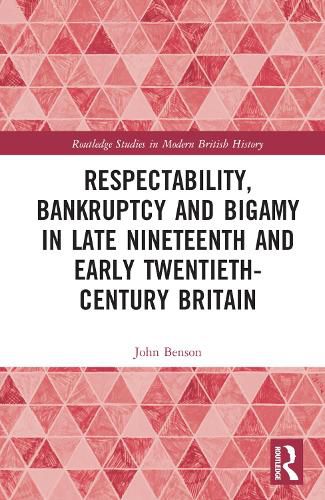Readings Newsletter
Become a Readings Member to make your shopping experience even easier.
Sign in or sign up for free!
You’re not far away from qualifying for FREE standard shipping within Australia
You’ve qualified for FREE standard shipping within Australia
The cart is loading…






Respectability, Bankruptcy and Bigamy in Late Nineteenth and Early Twentieth-Century Britain explores the vexed question of middle-class respectability in Victorian and Edwardian Britain. It focuses upon the life of London solicitor Hamilton Pawley (1860-1936), who was barred from working by the Law Society, twice declared bankrupt, and in 1919 was sentenced to eighteen months’ imprisonment with hard labour for bigamously marrying a woman practically forty years his junior. If Pawley did not suffer the revenge of respectable society, it is difficult to think who would.
Drawing upon the fact that the disgraced and the disreputable have always tended to attract a disproportionate amount of attention, the book ranges widely, exploring such important issues as middle-class education, career choices, the dynamics of family life, and the workings of the late nineteenth and early twentieth-century legal system. It shows that Pawley was able to hold on to his professional - and even gentlemanly - status for far longer than seemed likely. This all suggests, the book concludes, that although respectability was as important to the middle class as we have always been told, it was both easier to acquire and easier to retain than we have generally been led to believe.
This book will appeal to all those interested in British society in the late nineteenth and early twentieth centuries.
$9.00 standard shipping within Australia
FREE standard shipping within Australia for orders over $100.00
Express & International shipping calculated at checkout
Respectability, Bankruptcy and Bigamy in Late Nineteenth and Early Twentieth-Century Britain explores the vexed question of middle-class respectability in Victorian and Edwardian Britain. It focuses upon the life of London solicitor Hamilton Pawley (1860-1936), who was barred from working by the Law Society, twice declared bankrupt, and in 1919 was sentenced to eighteen months’ imprisonment with hard labour for bigamously marrying a woman practically forty years his junior. If Pawley did not suffer the revenge of respectable society, it is difficult to think who would.
Drawing upon the fact that the disgraced and the disreputable have always tended to attract a disproportionate amount of attention, the book ranges widely, exploring such important issues as middle-class education, career choices, the dynamics of family life, and the workings of the late nineteenth and early twentieth-century legal system. It shows that Pawley was able to hold on to his professional - and even gentlemanly - status for far longer than seemed likely. This all suggests, the book concludes, that although respectability was as important to the middle class as we have always been told, it was both easier to acquire and easier to retain than we have generally been led to believe.
This book will appeal to all those interested in British society in the late nineteenth and early twentieth centuries.